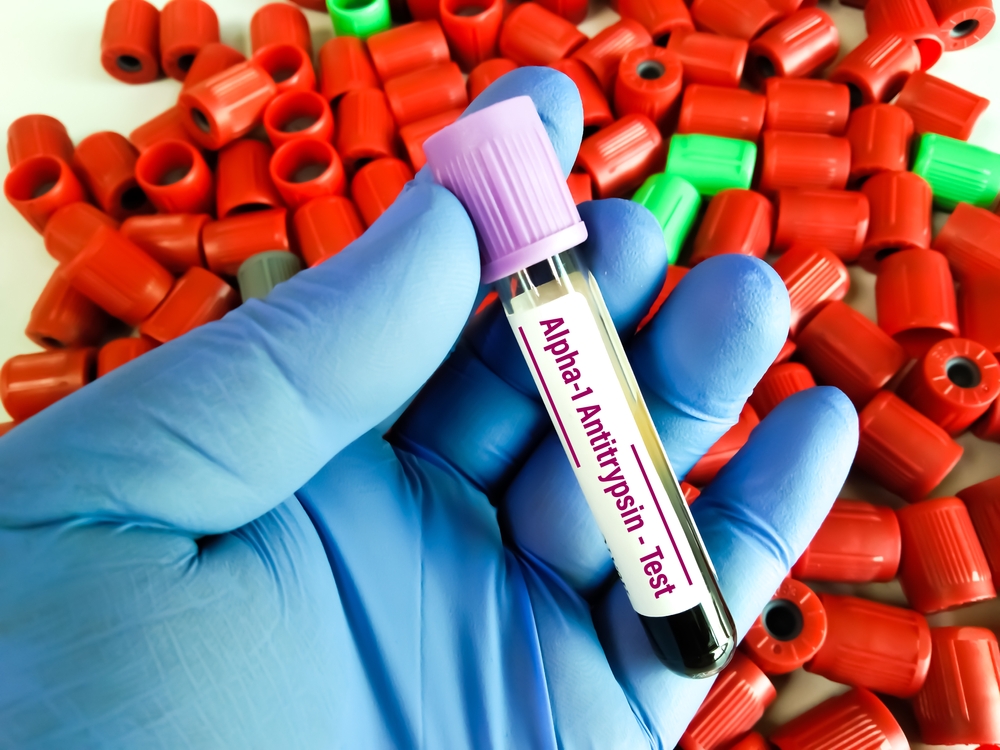Alpha-1 Antitrypsin Deficiency

Alpha-1 antitrypsin (AAT) deficiency is a hereditary condition in which the risk for lung and other diseases increases. AAT is a protein produced in the liver that helps to protect the lungs. Therefore, a deficiency of AAT can make your lungs more easily susceptible to damage from smoking, pollution, or dust from the environment. This can lead to COPD and also cause a liver disease called cirrhosis. This is more prevalent in children who have AAT deficiency.
Many people do not suffer from AAT deficiency, but an early diagnosis can help prevent complications like COPD and serious lung and liver diseases. If you have a family member with AAT deficiency or diagnosed with COPD in their 40s or 50s, it is advisable to talk to a doctor. Prevention or delay of COPD can also be achieved if you quit smoking.
Causes:
Offspring inherit two AAT genes, one gene from each parent. If a mutated gene is inherited from each parent, the person will have AAT deficiency. But if a mutated AAT gene from one parent and a normal AAT gene from the other parent is inherited, they will be carriers for the condition. The carriers might sometimes have lower levels of AAT protein in their blood, but you most likely will not have an AAT deficiency.
AAT deficiency is a complicated disease that may have risk factors, such as smoking, and some other unknown factors. Sometimes, in rare situations, a person might inherit two mutated AAT genes, and still not show any symptoms or health issues.
Symptoms:
Some people do not develop related diseases and are asymptomatic. They might be completely unaware of the presence of the disorder. Symptomatic people usually notice them between ages 20 and 50.
People with lung diseases caused by AAT deficiency have symptoms similar to those of chronic obstructive pulmonary disease (COPD). Exertion and shortness of breath are typical.
Other symptoms include:
- Allergies that last all year.
- Extreme tiredness.
- Frequent chest colds.
- Shortness of breath.
- Unexplained weight loss.
- Wheezing.
Signs and symptoms of liver diseases may include:
- Easy bruising
- Jaundice (yellowing of the skin and eyes)
- Swelling in the belly or legs from fluids
- Vomiting blood
Diagnosis:
Doctors often miss diagnosing people with Alpha-1 as having asthma, because symptoms are shared in these cases, especially shortness of breath. If the patient does not respond well to asthma treatment, then further tests might be done to diagnose Alpha-1. Otherwise, if one shows symptoms and has a family history of COPD or AAT deficiency-related diseases, then they might ask the doctor whether Alpha-1 could be causing the symptoms and request being tested.
These can include:
- Blood test: A blood sample is taken to measure the levels of AAT and Alpha-1 type (i.e., check for abnormal genes for Alpha-1) as well as other substances.
- Imaging tests: X-rays and CT scans can be very helpful in confirming and identifying signs of Alpha-1 in the lungs. Using these tests doctors can locate the damage and determine its severity.
- Genetic tests: The study of a blood sample of family members can help to identify abnormal genes associated with Alpha-1.
Treatment:
Treatment of Alpha-1 antitrypsin deficiency (AATD) is focused on symptoms, as there is currently no cure. The goal of AATD management is the inhibition or retardation of the progression of lung disease.
Bronchodilators and antibiotics for upper respiratory tract infections are general treatments to help with lung functions. In severe cases, lung transplantation may be a good option. Replacement (augmentation) therapy with the missing AAT protein can be an option under special circumstances. although its effectiveness is not known once the disease has developed.
Conclusion:
Alpha-1 antitrypsin deficiency (AAT deficiency) is an inherited disorder that increases your chances of developing lung and liver disease. The protein alpha-1 antitrypsin (AAT) protects the lungs. It is produced by the liver. If the AAT proteins are not the correct shape, they become stuck in the liver cells and are unable to reach the lungs.


